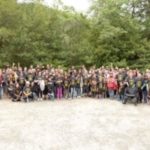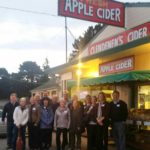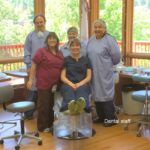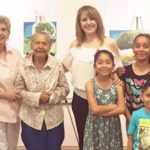Search Results for:
Introducing United Indian Health Services Behavioral Health Program
Every day, Vesper Society links arms with leaders in overlooked communities that want to create a healthy future and helps them devise ways to do it. Through partnerships and collaborations, we are better able to leverage resources that have great impacts on the communities we serve. United Indian Health Services (UIHS) in Northwest California has been providing comprehensive healthcare to Native American communities for over 40 years. Dedicated to providing mental, dental, vision, behavioral health, and community wellness services to two counties, UIHS serves more than 10,000 Native American clients. Behavioral health services are particularly beneficial to the Yurok Tribe in the Weitchpec area of the Yurok Reservation in eastern Humboldt County. Prior to 2016, the community had extremely limited and sporadic access to behavioral health services due to the difficulty and costs of staffing in the remote location. After the Yurok Tribe declared a State of Emergency in 2015 in response to a cluster of Native youth suicides, UIHS set out to support the community in a culturally-appropriate and significant way. The Federal Substance Abuse and Mental Health Service Agency (SAMHSA) reports that Indigenous communities that work to preserve their cultural heritage and work to control their own destinies are dramatically more successful in protecting their youth against the risks of suicide. This approach of combining culture and healthcare is essential in developing sustainable and impactful changes within this community. After UIHS hired a full-time behavioral health clinician to work in this area, the organization focused on suicide prevention activities and education efforts in the region, and collaborated closely with county and tribal leaders to address the crisis. It was incredibly effective: the community did not experience any suicides for two years. The State of Emergency declaration expires early this year, as does tribal funding for those services,... Read More
Welcome New Board Members!
Vesper Society is happy to link arms with three new leaders who join our board of directors: Adina Safer, Lyell Sakaue, and Cynthia So-Armah. These three share Vesper’s belief in the simple idea that a just society begins when everyone is well and respected as a human being. We look forward to working with them to find long-term solutions that improve the health and well-being of overlooked communities. Adina Safer has spent her career focused on the business and the changing ways healthcare providers are receiving payments. And for over fifteen years, she has worked to increase access and equity in public education. Lyell Sakaue has collaborated with numerous organizations in the social sector to refine their strategies to achieve greater social impact. His work emphasizes creating pathways to improve economic mobility, racial justice efforts, and initiatives to shape public policies. Dr. Cynthia So-Armah is a primary care internist in Massachusetts where she serves a predominantly Dominican immigrant patient population. As a student, she helped to found a nonprofit in the Dominican Republic to create access to quality education for students there. These remarkable individuals reflect our commitment to our values of service, justice, and partnership. With their compassion and expertise on our board, we are one step closer to realizing the potential for healthy communities to thrive and prosper. Learn more about board... Read More
Thank You
Vesper Society believes in a simple idea: a just society begins when everyone is well and respected as a human being. Every day, Vesper Society links arms with leaders of overlooked communities that want to create a healthy future. How does a board of directors do this? Last month, 12 Vesper board members gathered in the San Francisco Bay Area and made the six-hour drive to Humboldt County to meet with community leaders. Over the next three days, the board members connected to a part of the state that many had never visited before. While there, we learned so much from our program partners–United Indian Health Services and Open Door Community Health Center. Leaders from the North Coast Grantmaking Partnership, McLean Foundation, California Center for Rural Policy, and True North generously gave of their time and talent to share their knowledge and life experiences. We were especially struck by the warm welcome we received in Fortuna where each Vesper board member received a personal note from a community member. One person thanked Vesper Society for “seeing humanity in a larger sense,” and “for reaching out to help people in need, and for understanding that caring is much more than just words.” The letter concluded, “It is you and people like you who help all of us have hope for the future of humanity.” We were touched by the sentiment, and we also turn that gratitude to each of you reading this. These bonds of friendship, of sharing together, of being together in our struggles to improve our communities is what sustains us during both the good times and difficult times. During this holiday season, we are grateful for your partnership, for being able to make a difference at the local level, and to count each of you as part of... Read More
Vesper Society Honors 500 Years of Protestant Reformation
500 years ago, Martin Luther’s 95 Theses critiquing the Catholic Church shook the world and resulted in the beginning of Protestant Reformation. As we commemorate this significant event, we also honor and appreciate that we live in vastly different times. Lutheran and Catholic Christians now seek out commonalities that overcome past church-dividing differences, and we are telling this history in new ways. Today, our world is more varied and secular. Vesper Society—with deep roots in the Lutheran tradition—believes in a simple idea: a just society begins when everyone is well and respected as a human being. We mark this time in the Lutheran tradition’s history by asking Rev. Melissa Maxwell-Doherty, Vice President of Mission and Identity at the California Lutheran University in Thousand Oaks, to reflect on what the Reformation tradition means for those who engage in interfaith cooperation and engagement. I quote Rev. Elizabeth Eaton, presiding bishop of the ELCA (Evangelical Lutheran Church in America) who states in Engaging Others, Knowing Ourselves: A Lutheran Calling in a Multi-Religious World – “We all live and work in an increasingly multi-ethnic, inter-religious context. In our daily encounters with diversity, what are the theological and practical challenges we face? What from our Lutheran tradition is instructive for understanding our inter-religious calling and living out of community?” I believe that Martin Luther’s emphasis on the generosity and grace of God can fuel and inform the way that we live out our relationships with our neighbors, especially our neighbors from religious or philosophical traditions different from our own. I stand aware that all of life comes as a sheer gift from the hand of God. All I have received—human community, planet home, artistic expression, and the necessities and nourishment for daily life—all come from the bounty of God’s blessing given to me without... Read More
Introducing United Indian Health Services Dental Program
In the face of overwhelming urbanization, Vesper Society cares about what happens in rural areas. This is why we support United Indian Health Services (UIHS), which has been providing comprehensive healthcare to Native American communities in remote Northwest California for over 40 years. UIHS runs two large clinics in Arcata (Humboldt County) and Crescent City (Del Norte County). Even with these two clinics serving the more populated towns in a very remote region, some residents still needed to travel three hours each way for a one-hour appointment. Committed to making quality healthcare more accessible, UIHS established a smaller satellite health center in Weitchpec offering weekly medical services. The location is a cultural hub for the Yurok Tribe and a convenient location for those who live along the upper Klamath River. The Native American Oral Health Care Project reports that dental decay is 300 times more likely in the American Indian population than it is in the general U.S. population. Recognizing a medical need not met by their current offerings, UIHS goes above and beyond to provide dental services. Twice a year, staff members pack up dental chairs, equipment, and computers and drive a narrow two-lane road through the mountains to set up shop at the Libby Nix Community Center in Weitchpec. They live there for two weeks, providing much-needed dental services like exams, fillings, extractions, cleanings, and oral hygiene instructions. Tribal government leaders keenly understand the oral health crisis in their communities, and UIHS is working closely with the tribes to provide more consistent and comprehensive dental services to this community. Vesper Society admires UIHS’s approach in linking arms with leaders of overlooked communities to create a healthy future. We are honored to support these important long-term solutions that take us one step closer to realizing the potential for... Read More
Reflections on Serving A Rural Church and Community
Vesper Society links arms with leaders of overlooked communities that want to create a healthy future. This month, we asked Pastor Ron Griffen from the First United Methodist Church in Imperial County, California, to reflect on what it means to be a church in a rural setting. His perspective offers a glimpse into what is possible if each one of us reaches out with love to our neighbor. For the past eight years, I have served a rural church and community. Rural settings are different from urban and suburban ones. To begin, rural communities have less access to resources. Living and working “under the radar” can be both a blessing and a curse. As a pastor, I’ve noticed that the institutional church seems to question the importance of rural churches. Case in point: At our Annual Conference two years ago, we were in small groups discussing issues facing the church, and I offered my two cents worth. One of my colleagues asked, “Does the Bishop know how you feel about this?” I answered, “I don’t think the Bishop knows where I am.” To which my colleague responded, “Where are you?” For the record, I’m in El Centro. My position here has led me to understand that the role of church in society—especially in a rural setting—has three essential tasks. Focus primarily on the needs of one’s own community. Collaborate whenever and wherever you can. Remember that ALL the important work of the church is done locally. The last task is the hardest for many of us. We want to save the world. The problem is that thinking only of the big picture means we run the risk of never saving anything. Here’s an example: Our church’s young group had planted and tended to a small garden. I saw how... Read More






